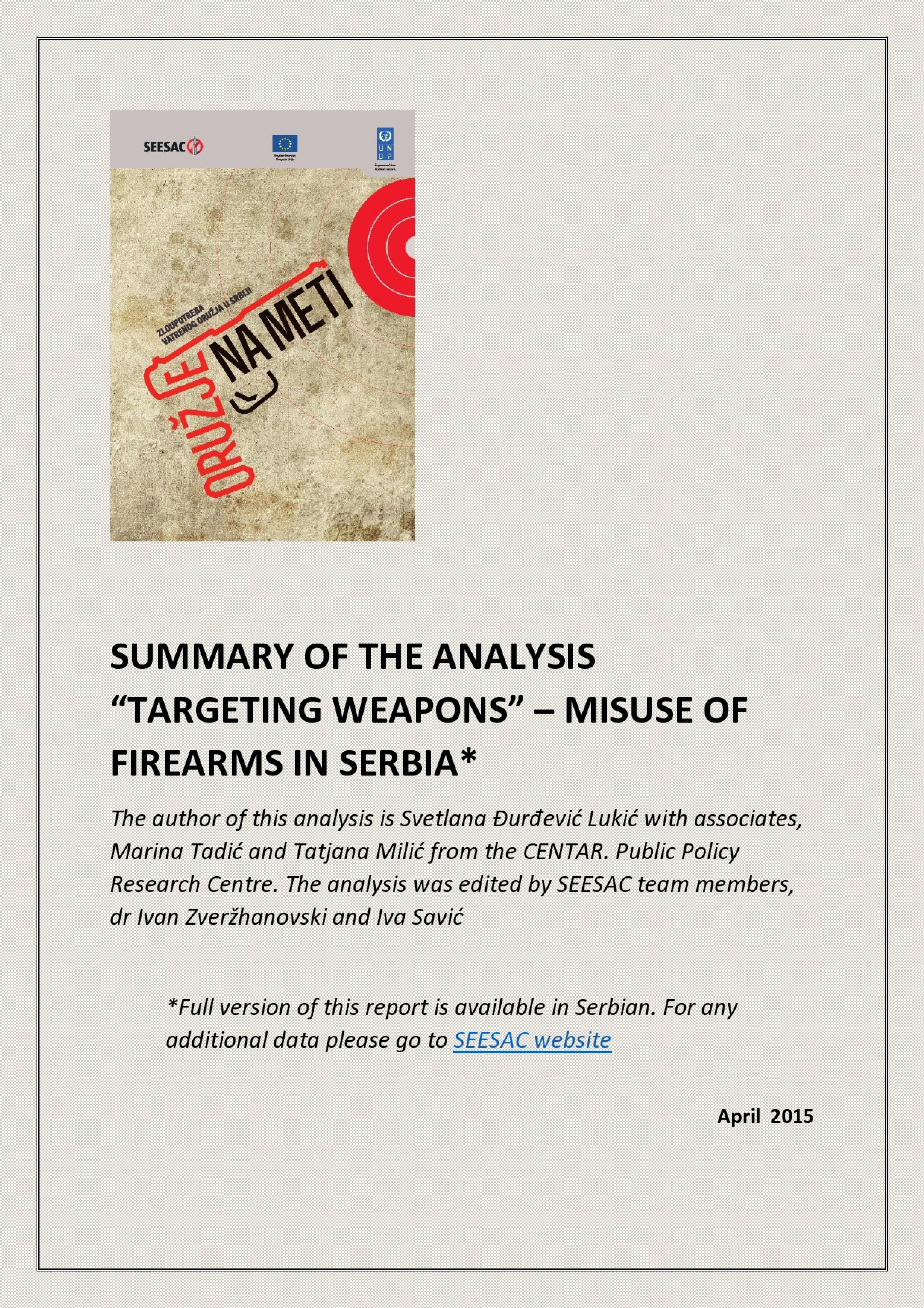Project: Firearms Possession and Human (In)Security: Impact on youth and gender based violence07Jul2016
An Op-Ed of Ms. Svetlana Djurdjevic-Lukic, CENTRE's Director for the Weekly NIN: A set of policy measures is needed to reduce firearms possession
Within the cover story of the weekly news magazine "NIN" on July 7th 2016, op-ed of Ms. Svetlana Djurdjevic-Lukic, one of the very few persons in Serbia specialized in issues related to the civilian possession of firearms, was published. Commenting on the last week's massacre in Zitiste, committed by the illegally possessed automatic rifle, the CENTRE’s director criticized opinions stressing out that "the person is responsible for the crime, not the weapon itself", as well as those implying how "it is impossible to resolve the issue of illegal firearms possession". Considering such approach unproductive, she underlined that the widespread civilian possession of firearms increases possibilities for incidents resulting in fatal consequences, including women and children being killed. The mere presence of firearms affects even personnel which is trained to use them, as illustrated by the higher rate of suicide among police officers, in comparison with general population of Serbia. Furthermore, while other means for causing bodily harm are available, the firearms are the most lethal. Additionally, there is a huge gender gap when it comes to firearms possession in Serbia, meaning that women are disproportionally more frequently victims of firearms related incidents, than perpetrators.

 All these issues require concentrated efforts to reduce civilian firearms possession, especially illegal ones. However, the Minister of Interior’s press release on July 1st 2016 announcing the beginning of firearms legalization campaign, according to Ms. Djurdjevic, is not an appropriate way to tackle pervasiveness of small arms’ possession within the society (importantly, the campaign announced no consequences for citizens who have not yet legalized or returned the weapons, if they do so in the next three months). Such action was not thoroughly planned, it did not include consultations with various stakeholders, while publicly presented data are lacking on number, gender, age and profile of victims and perpetrators, and their relationship, there are no specific mesuares tailored towards various social groups. Hence, while every surrendered small firearms count, she believes there is a strong possibility for the latest action, to repeat the failure of the previous one. Namely, only around 2,200 firearms were handed in the period between March-June 2015, when similar action was announced after the of promulgation of the new Law on weapons, which makes only 1% of the given official estimation by the Ministry of Interior, indicating that Serbia’s citizens possess between 200,000 and 900,000 pieces of illegal weapons.
All these issues require concentrated efforts to reduce civilian firearms possession, especially illegal ones. However, the Minister of Interior’s press release on July 1st 2016 announcing the beginning of firearms legalization campaign, according to Ms. Djurdjevic, is not an appropriate way to tackle pervasiveness of small arms’ possession within the society (importantly, the campaign announced no consequences for citizens who have not yet legalized or returned the weapons, if they do so in the next three months). Such action was not thoroughly planned, it did not include consultations with various stakeholders, while publicly presented data are lacking on number, gender, age and profile of victims and perpetrators, and their relationship, there are no specific mesuares tailored towards various social groups. Hence, while every surrendered small firearms count, she believes there is a strong possibility for the latest action, to repeat the failure of the previous one. Namely, only around 2,200 firearms were handed in the period between March-June 2015, when similar action was announced after the of promulgation of the new Law on weapons, which makes only 1% of the given official estimation by the Ministry of Interior, indicating that Serbia’s citizens possess between 200,000 and 900,000 pieces of illegal weapons.
In conjunction with the analytical data and comprehensive campaign in close cooperation with civil society members, additional measures are necessary. One of them is zero tolerance to the perpetrators of violence in general, especially to gender-based violence, and particularly when it is committed by the security structures’ members. Such promise was given by the Minister of Interior, Mr. Nebojsa Stefanovic, during recent election campaign. Crucially, the action of firearms legalization has to include other stakeholders, such as the Ministry of Finance, which should either abandon the collection of taxes on firearms possession or at least reduce them. Current high level of taxes does not motivate citizens to register illegally possessed firearms. A various models of additional incentives, aimed to reduce the circulation of the weapon, have been offered in this region, such as the buy-back (cash) by the state in Croatia, the organization of lottery with valuable prices in Bosnia for those participating in the firearm legalization, and so-called ‘weapons for development’ model of extra-funding for municipalities proved to be the most successful in collecting illegal firearms in Albania.
CENTRE’s director stressed out the activities of Serbia’s women’s organizations alarming public on the high rate of femicide, but also that the mere fact of presence of firearms in the house can intimidate the household members, and more general perpetuation of vulnerability among communities with different attitudes toward and accessibility to firearms.



